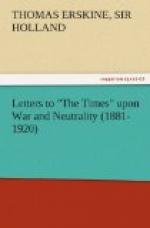It does not follow, however, that this is the limit of the remedy that may be applied. Even though it may be found that Federal authority is not broad enough to fully reach the case, there can be no doubt of the power of the several States to act effectively in the premises, and there should be no reason to doubt their willingness to judiciously exercise such power.
The State legislation to which President Cleveland looked for relief from the evils of trusts has failed to accomplish fully that object. This is probably due to a great extent to the fact that different States take different views as to the proper way to discriminate between evil and injurious combinations and those associations which are beneficial and necessary to the business prosperity of the country. The great diversity of treatment in different States arising from this cause and the intimate relations of all parts of the country to each other without regarding State lines in the conduct of business have made the enforcement of State laws difficult.
It is apparent that uniformity of legislation upon this subject in the several States is much to be desired. It is to be hoped that such uniformity founded in a wise and just discrimination between what is injurious and what is useful and necessary in business operations may be obtained and that means may be found for the Congress within the limitations of its constitutional power so to supplement an effective code of State legislation as to make a complete system of laws throughout the United States adequate to compel a general observance of the salutary rules to which I have referred.
The whole question is so important and far-reaching that I am sure no part of it will be lightly considered, but every phase of it will have the studied deliberation of the Congress, resulting in wise and judicious action.
A review of our relations with foreign States is presented with such recommendations as are deemed appropriate.
The long-pending boundary dispute between the Argentine Republic and Chile was settled in March last by the award of an arbitral commission, on which the United States minister at Buenos Ayres served as umpire.
Progress has been made toward the conclusion of a convention of extradition with the Argentine Republic. Having been advised and consented to by the United States Senate and ratified by Argentina, it only awaits the adjustment of some slight changes in the text before exchange.
In my last annual message I adverted to the claim of the Austro-Hungarian Government for indemnity for the killing of certain Austrian and Hungarian subjects by the authorities of the State of Pennsylvania, at Lattimer, while suppressing an unlawful tumult of miners, September 10, 1897. In view of the verdict of acquittal rendered by the court before which the sheriff and his deputies were tried for murder, and following the established doctrine that the Government may not be held accountable for injuries suffered by individuals at the hands of the public authorities while acting in the line of duty in suppressing disturbance of the public peace, this Government, after due consideration of the claim advanced by the Austro-Hungarian Government, was constrained to decline liability to indemnify the sufferers.




